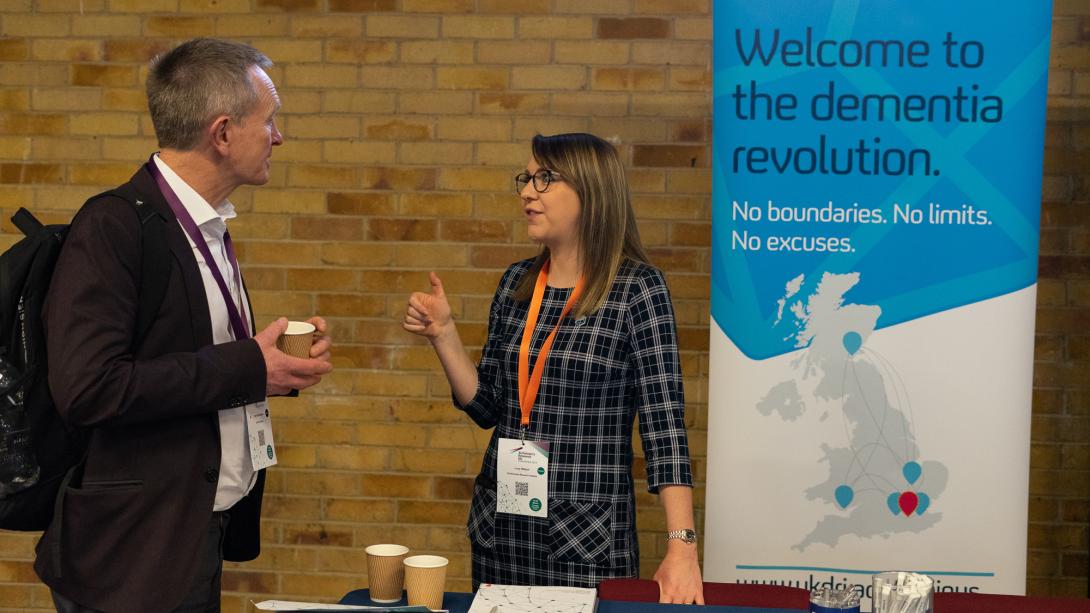Between 19-20th March, over 500 delegates came together in the small town of Harrogate in Yorkshire for the annual Alzheimer’s Research UK (ARUK) Conference – a particular highlight in the dementia meeting calendar.
Day 1: From neuroinflammation to the challenges of early diagnosis
It is not often that you are greeted to a scientific conference by video, let alone by a national treasure of Stephen Fry’s standing. It was fitting that his words were some of the first to echo around the spectacular theatre space of the main hall and an inspiring tone was set for the rest of the meeting.
Following an interesting morning session on the topics of Dementia with Lewy Bodies, delegates heard a special a keynote lecture by Prof Philip Scheltens from Amsterdam University Medical Centre. Prof Scheltens gave a historical overview on the development of dementia diagnostics, advocating the use of early biological markers to aid investigation of disease mechanism and increase efficiency in clinical trial patient recruitment.
The topic of the keynote lent itself well to the lively debate in the subsequent panel discussion, addressing the benefits and challenges of early diagnosis, especially given the paucity of disease-modifying treatments currently available. A regular feature of dementia meetings, the debate turned to the role of amyloid-beta in the Alzheimer’s disease pathway and, in this case, its utilisation as a diagnostic marker predicting progression to dementia. As many individuals with positive amyloid-beta PET scans do not go on to development dementia, it would be important to inform the public on this distinction between Alzheimer’s disease with and without dementia, in order not to mislead in diagnosis. Nevertheless, panellists were all in agreement that a plethora of diagnostic tools would be advantageous if accurate and accessible dementia diagnosis was to become a reality in the future.
delegates joined the ARUK 2019 meeting
It was great to see a key theme of the UK DRI reflected in the final afternoon session: neuroinflammation. UK DRI theme lead, Prof Hugh Perry, begun by outlining the current thinking on the role of microglial immune cells in dementia-related conditions. While many debate whether activating or supressing neuroinflammation would slow disease progression, Prof Perry suggested that encouraging immune cells to adopt their homeostatic phenotype could be beneficial.
Prof Paul Morgan, UK DRI at Cardiff, gave an overview on why the Complement system may be a promising target, with a number of therapeutics already developed. Prof Maria Grazia Spillantini from Cambridge concluded the session, presenting recent work investigating phagocytosis of living, but dysfunctional neurons, by microglial cells – identifying potential target pathways for intervention.
Poster discussions
As ever the poster hall was awash with exciting new research from early career researchers, a great platform to share their latest findings with the community. Amongst them, Samantha De La-Rocque, PhD student at UK DRI at UCL, outlined her work using a split GFP molecule to investigate Tau uptake in diseased neurons. If successful, this assay could be utilised to determine therapeutic efficacy in halting Tau propagation.
posters presented
Dr Chris Henstridge, UK DRI at Edinburgh, presented a small pilot project set up to encourage interaction between dementia researchers and patients. Through initiatives such as lab visits and meetings, the scheme has caused much discussion about public awareness of dementia and how researchers can do more to help.
Daniel Solomon, PhD student at UK DRI at KCL, presented a poster on nuclear pore dynamics in ALS and FTD, hypothesising that disrupted transport between the nucleus and cytoplasm may be a key disease mechanism in these two conditions. We are excited to see what these biophysical studies reveal in the near future.
In the exhibition hall, we met with a number of delegates to discuss the current progress and vision of the UK DRI. It was great to have the chance to share career development and collaboration opportunities available at the institute with the wider dementia research community.

Day 2: Genetics to disease modelling
The Day 2 session on genetics and epigenetics kicked off with a fascinating presentation from Prof Lesley Jones, Associate Member at UK DRI at Cardiff. Prof Jones took delegates through her group’s work investigating age of onset in Huntington’s disease. Using GWAS and selective individual exome sequencing, implicated genes pointed towards DNA repair pathways and it will be intriguing to see whether this research translates across other diseases with DNA repeat expansions.
Following other insightful sessions on Vascular dementia and prevention and risk reduction, the conference concluded with the topic of disease modelling. Prof Valentina Escott-Price, UK DRI at Cardiff, begun the session by outlining why genomic profiling is a promising tool in predicting disease progression. Prof Escott-Price believes that, while still in its infancy, this tool could be aligned beside other biomarkers to increase accuracy of predictions.
The annual ARUK conference rarely disappoints and this year was no exception. We were delighted to see such a rich representation from UK DRI labs alongside great colleagues. We are confident that future research from our groups and the wider community will make strides towards conquering dementia.
speakers & 1 panel discussion
